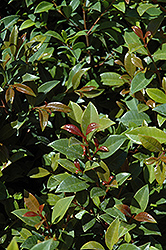It's all about ...
plants

Height: 25 feet
Spread: 15 feet
Sunlight:
![]()
Hardiness Zone: 8b
Other Names: Brazilian Cherry, Cayenne Cherry, Florida Cherry
Description:
An excellent choice for hedging or screening; beautiful foliage emerges red, young leaves are coppery bronze, maturing to deep glossy green; attractive white flowers in spring or summer and edible berries in fall
Ornamental Features
Surinam Cherry features showy white pincushion flowers with yellow anthers at the ends of the branches from mid spring to mid summer. It has attractive dark green evergreen foliage which emerges dark red in spring. The glossy pointy leaves are highly ornamental and remain dark green throughout the winter. It features an abundance of magnificent red berries in late summer. The rough gray bark and brick red branches add an interesting dimension to the landscape.
Landscape Attributes
Surinam Cherry is a multi-stemmed evergreen tree with an upright spreading habit of growth. Its average texture blends into the landscape, but can be balanced by one or two finer or coarser trees or shrubs for an effective composition.
This tree will require occasional maintenance and upkeep, and can be pruned at anytime. It is a good choice for attracting birds to your yard. It has no significant negative characteristics.
Surinam Cherry is recommended for the following landscape applications;
- Accent
- Mass Planting
- Hedges/Screening
- General Garden Use
- Container Planting
Planting & Growing
Surinam Cherry will grow to be about 25 feet tall at maturity, with a spread of 15 feet. It has a low canopy with a typical clearance of 3 feet from the ground, and is suitable for planting under power lines. It grows at a medium rate, and under ideal conditions can be expected to live for 40 years or more.
This tree should only be grown in full sunlight. It prefers to grow in average to moist conditions, and shouldn't be allowed to dry out. It is not particular as to soil type or pH, and is able to handle environmental salt. It is somewhat tolerant of urban pollution. This species is not originally from North America.
Surinam Cherry is a fine choice for the yard, but it is also a good selection for planting in outdoor pots and containers. Its large size and upright habit of growth lend it for use as a solitary accent, or in a composition surrounded by smaller plants around the base and those that spill over the edges. It is even sizeable enough that it can be grown alone in a suitable container. Note that when grown in a container, it may not perform exactly as indicated on the tag - this is to be expected. Also note that when growing plants in outdoor containers and baskets, they may require more frequent waterings than they would in the yard or garden. Be aware that in our climate, most plants cannot be expected to survive the winter if left in containers outdoors, and this plant is no exception. Contact our experts for more information on how to protect it over the winter months.
This plant is not reliably hardy in our region, and certain restrictions may apply; contact the store for more information.
